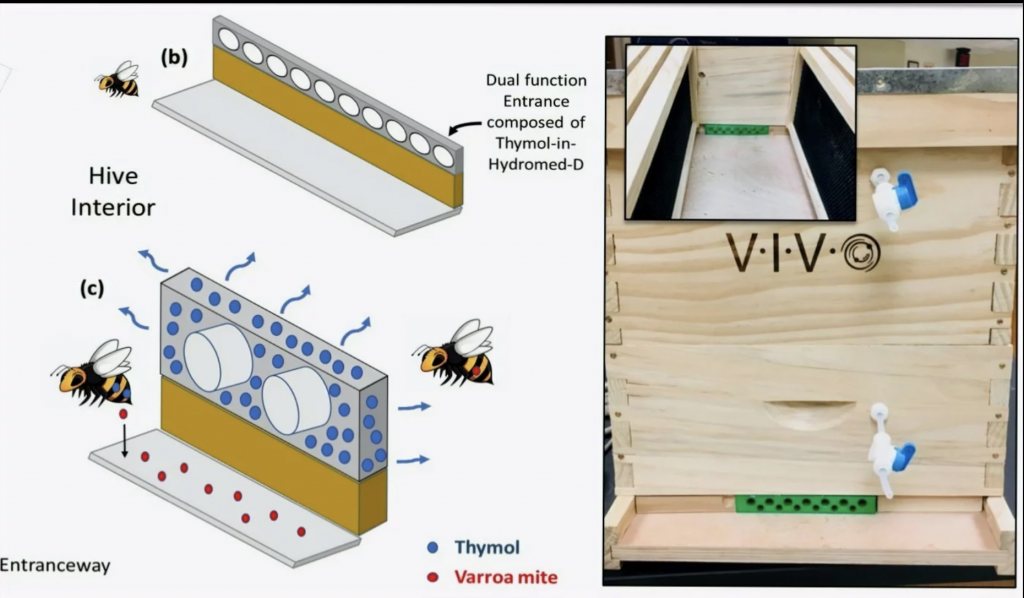A Conversation Between Save the Sound’s Climate Advocate Alex Rodriguez, Climate Policy Intern Spencer Kinyon, and HiveGuard Founder Raina Jan
Shining light on the advocacy and sustainability work of young environmental leaders working to make their communities safer and cleaner. As part of our commitment to youth engagement and equity, we are holding an ongoing series of interviews with individuals and sharing their stories to spread awareness.
Entrepreneurs are essential to creating sustainable business solutions to our world’s environmental problems. Raina Jain, who is a first-year student at the University of Connecticut, witnessed a collapse of a honeybee colony, and immediately started researching the root causes of the decline in honeybees. Raina learned that the varroa mite, a type of parasite, kills a majority of the world’s honeybees every year and is often responsible for colony collapse. In high school, Raina started to research and design a device that would prevent varroa mites from killing the honeybees. This led Raina to launch HiveGuard, which has successfully created a device that removes varroa mites from honeybee hives.
Alex: How did you get the initial idea to start HiveGuard?
Raina: In my junior year of high school, I was looking to do my own science research project. I visited a bee farm in northern Connecticut, and I witnessed a beekeeper cleaning out their hives. This happens almost every year, when a majority of the bees die in a colony. It was tragic to see all of these dead honeybees. This led me to research the root cause of honey bee collapse, and I read Dr. Samuel Ramsey’s research, who is an expert on honeybees. I learned about the varroa mites, and the damage that they cause to honeybees. However, thymol is a compound that kills the varroa mites, but does not kill the honeybees. I started thinking of ways that thymol could be used to help save the honeybees.

Spencer: How does the HiveGuard device work?
Raina: The HiveGuard device serves as an entryway to the beehive. The device is coated with a small amount of thymol that kills the varroa mites. As bees pass through the entryway and come into contact with the thymol, this guarantees that the parasite is killed, and the bee is safe.
Alex: How have you tested the HiveGuard device?
Raina: Prior to COVID-19, I had a research laboratory that allowed me to test the HiveGuard device on honeybees. This allowed me to collect data on the populations of honeybees, and the effectiveness of the device. I have had to answer important questions, such as “Does HiveGuard harm the honeybees?” and “Does HiveGuard contaminate the honey?”. I have been able to patent my design for HiveGuard as well. Originally, I was letting beekeepers test the product in exchange for important data about the hives. I have been able to give my product to beekeepers throughout the world, including those located in North America, Europe, and New Zealand. I have been fortunate enough to work with Dr. Samuel Ramsey and Andrew Oliver, who are experts on honeybees and have been able to help me with the product.
Spencer: How has COVID-19 impacted HiveGuard?
Raina: With COVID-19, I was no longer able to access my laboratory, so I had to pivot from the original HiveGuard device. I was inspired to create a consumer product that anyone could purchase. I developed a two ounce health shot that is created with honeybee products. For every bottle that is sold, a pollinator plant will be planted.
Alex: How has the University of Connecticut helped support HiveGuard?
Raina: David Noble, the Director of the Peter J. Werth Institute for Entrepreneurship and Innovation, has provided me with tremendous support. Whenever I have asked for something, UConn has always followed through. UConn has a summer innovation program that will help me to continue to develop HiveGuard. Through UConn, I have been connected with mentors, experiences, and a network of really helpful people that has let me expand my entrepreneurial skills.
Spencer: How do you hope HiveGuard will impact your community?
Raina: I am allergic to honeybees, and I couldn’t have ever imagined working with something I’m allergic to. It is so cool to see that an insect so small could be so intelligent, how they communicate in unison, and work for the betterment of the colony. I hope that one day the bees won’t need to be saved anymore. I hope we can learn to live in a balance with nature. If bees are able to collaborate with each other and have harmony, then humans should be able to.

